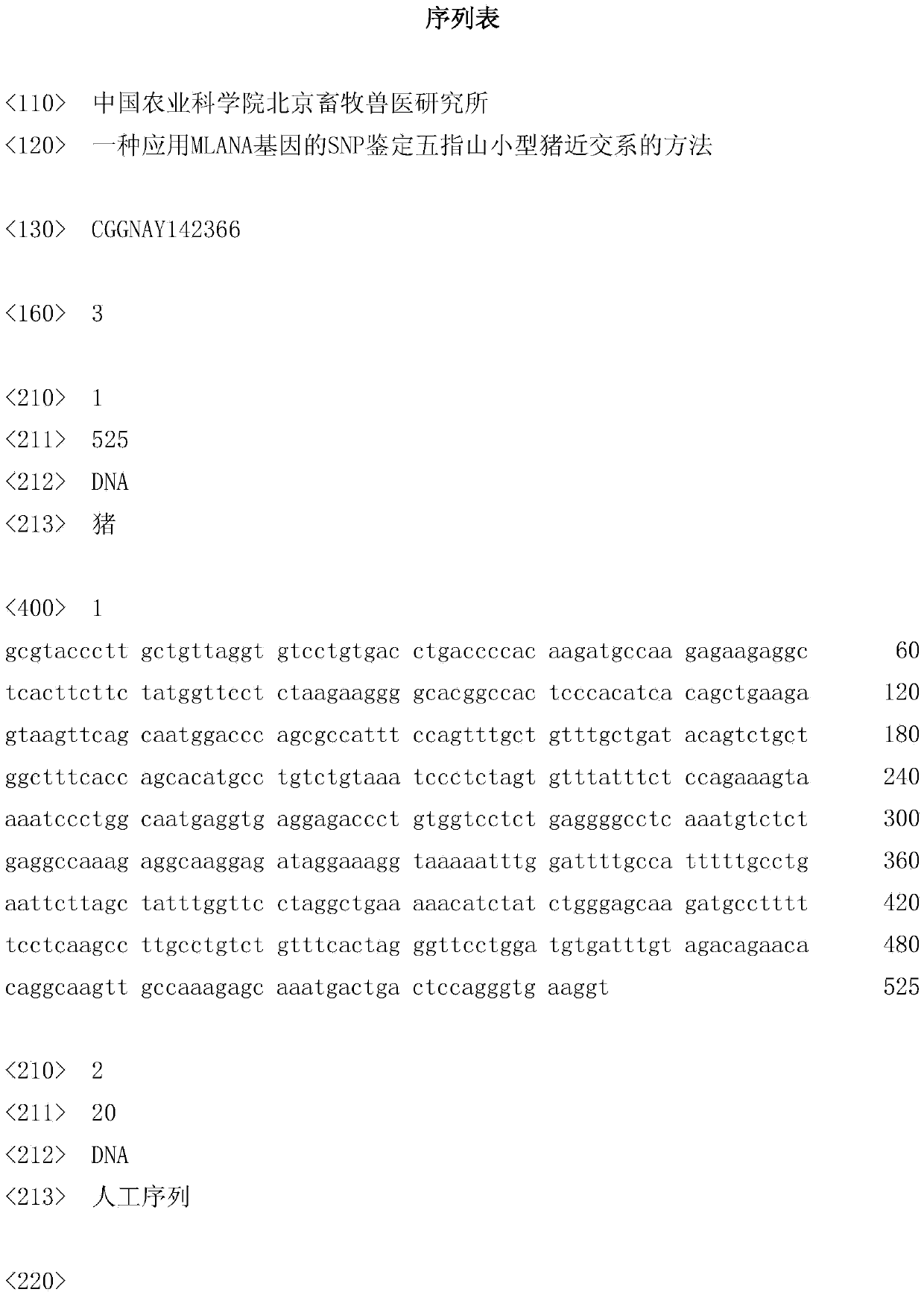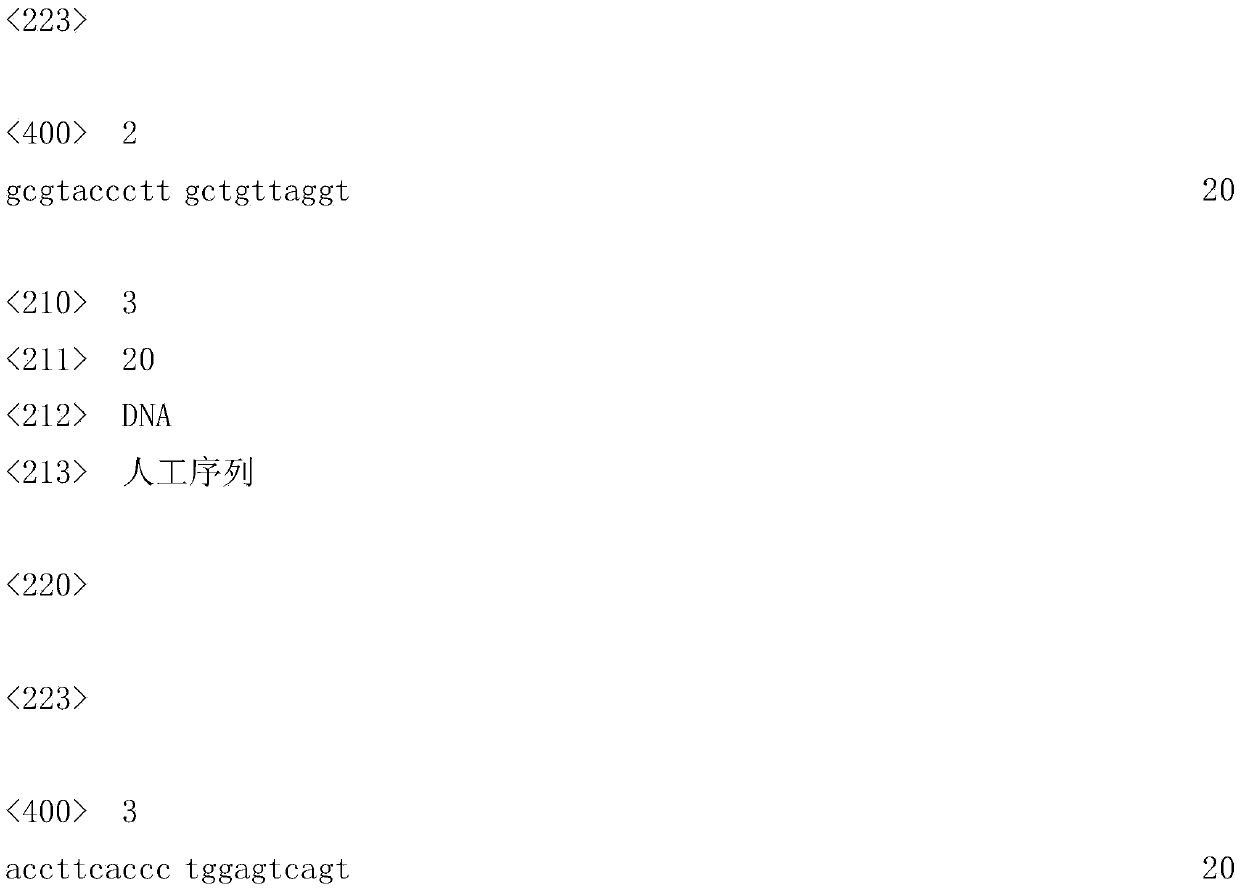A method for identifying inbred lines of Wuzhishan miniature pigs using snp of mlana gene
A technology of miniature pigs and inbred lines, applied in the direction of DNA/RNA fragments, recombinant DNA technology, microbial measurement/inspection, etc., can solve the problems of non-inbred line establishment standards and identification methods, etc.
- Summary
- Abstract
- Description
- Claims
- Application Information
AI Technical Summary
Problems solved by technology
Method used
Image
Examples
Embodiment 1
[0025] Example 1. Discovery of the genetic law of the "never homozygous" gene
[0026] Using the Illumina pig high-density SNP chip (60,000 SNPs), F in Wuzhishan minipig inbred lines 17 to F 22 A total of 6 generations and a total of 112 samples of Hainan Wuzhishan pig were genotyped systematically.
[0027] 1. Homozygosity analysis
[0028] Among the 61,565 effective SNPs distributed on 18 pairs of autosomes of the Wuzhishan minipig inbred line, F 20 The proportion of SNPs that has been fixed is as high as 80.0%. With the advancement of generations, some regions on almost all chromosomes are fixed slowly and regularly, and the heterozygosity is from large to small until it is 0, and these regions change with generations. The propulsion tends to become larger, and these phenomena are in line with the unique genetic laws of inbred animals. Almost all chromosomal regions of Hainan Wuzhishan pig population were highly heterozygous, and 61565 effective SNPs were diffusely, uni...
Embodiment 2
[0032] Example 2, the analysis of the heterozygosity of 1 locus, and further verification of the "never homozygous" gene
[0033] The analysis found that 7646 SNP sites in F 20 The above are still heterozygous, and these SNP sites can be mapped to 2238 genes. The analysis results show that more than 80% of the genes are involved in metabolic process (metabolic process, 750 genes in total, accounting for 45%) and cellular process (cellular process, 643 genes in total, accounting for 38.6%). Genome sequencing obtained consistent results. The reason for not being homozygous by the inbreeding process is revealed again.
[0034] Further analysis of the heterozygous SNP sites found that the inbred line had a site with a heterozygosity of 1, but it was not observed in the corresponding Hainan Wuzhishan pig site, and this phenomenon was observed in each inbred line. There is still an irregular and mosaic-like change trend in the cross-generation, that is: F 17 There are 21 loci wi...
Embodiment 3
[0036] Example 3. Identification of Wuzhishan Miniature Pig Inbred Lines and Non-Wuzhishan Miniature Pig Inbred Lines Using Never Homozygous MLANA Gene
[0037] Function of MLANA gene: involved in cellular immunity. The SNP site involved in the present invention is located on the MLANA gene, and the SNP site is the 206th nucleotide from the 5' end of sequence 1 in the sequence listing, which is an A / G mutation.
[0038] The sample to be tested is F from the inbred strain of Wuzhishan miniature pigs 17 to F 22 A total of 96 pigs from 6 generations (16 pigs per generation) and 34 Hainan Wuzhishan pigs. Each sample to be tested is carried out as follows:
[0039] 1. Take a blood sample and extract genomic DNA from the blood sample.
[0040] 2. Using the genomic DNA extracted in step 1 as a template, perform PCR amplification with a primer pair composed of F1 and R1 (the annealing temperature is 55° C.), and obtain a PCR amplification product with a length of 525 bp.
[0041]...
PUM
 Login to View More
Login to View More Abstract
Description
Claims
Application Information
 Login to View More
Login to View More - R&D
- Intellectual Property
- Life Sciences
- Materials
- Tech Scout
- Unparalleled Data Quality
- Higher Quality Content
- 60% Fewer Hallucinations
Browse by: Latest US Patents, China's latest patents, Technical Efficacy Thesaurus, Application Domain, Technology Topic, Popular Technical Reports.
© 2025 PatSnap. All rights reserved.Legal|Privacy policy|Modern Slavery Act Transparency Statement|Sitemap|About US| Contact US: help@patsnap.com


